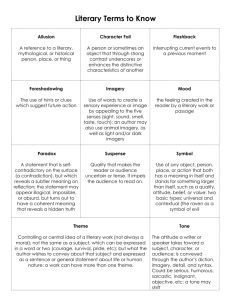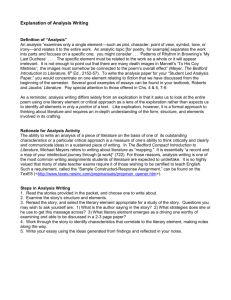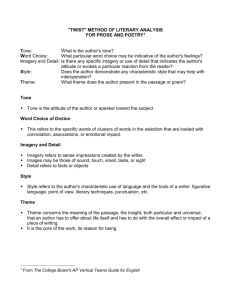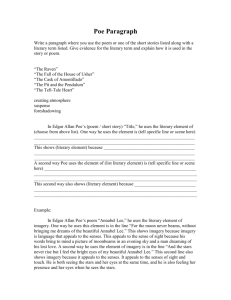Literary Lexicon
advertisement
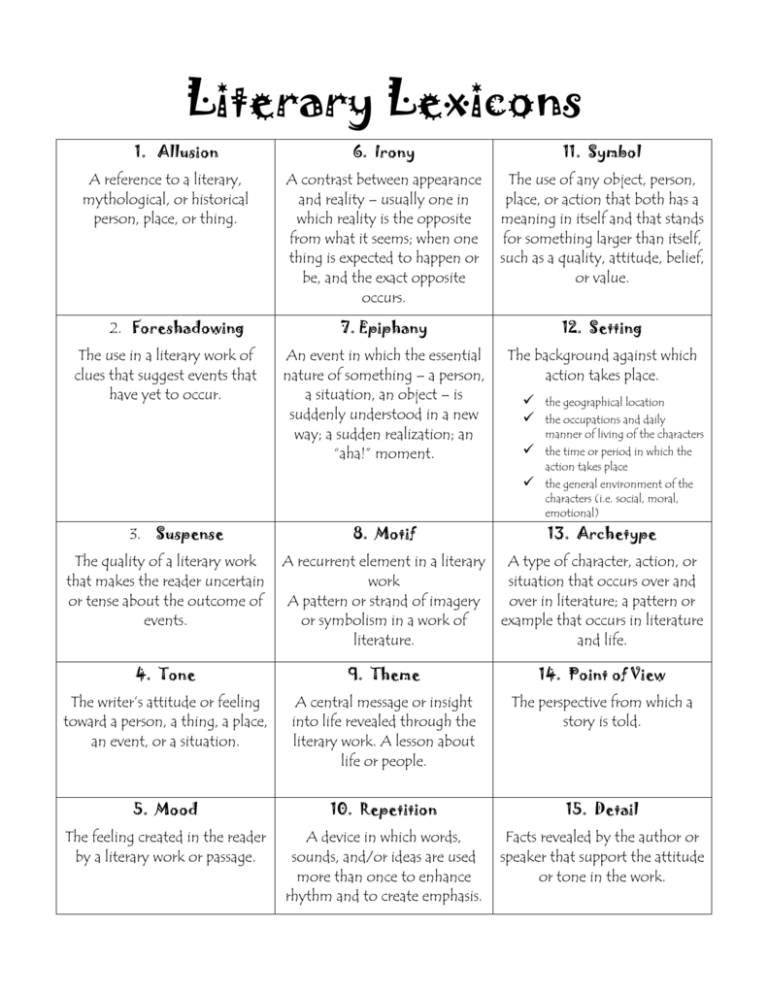
Literary Lexicons 1. Allusion A reference to a literary, mythological, or historical person, place, or thing. 2. Foreshadowing The use in a literary work of clues that suggest events that have yet to occur. 11. Symbol A contrast between appearance and reality – usually one in which reality is the opposite from what it seems; when one thing is expected to happen or be, and the exact opposite occurs. The use of any object, person, place, or action that both has a meaning in itself and that stands for something larger than itself, such as a quality, attitude, belief, or value. 7. Epiphany 12. Setting An event in which the essential nature of something – a person, a situation, an object – is suddenly understood in a new way; a sudden realization; an “aha!” moment. The background against which action takes place. the geographical location the time or period in which the action takes place the general environment of the characters (i.e. social, moral, emotional) the occupations and daily manner of living of the characters 8. Motif 13. Archetype The quality of a literary work that makes the reader uncertain or tense about the outcome of events. A recurrent element in a literary work A pattern or strand of imagery or symbolism in a work of literature. A type of character, action, or situation that occurs over and over in literature; a pattern or example that occurs in literature and life. 4. Tone 9. Theme 14. Point of View The writer’s attitude or feeling toward a person, a thing, a place, an event, or a situation. A central message or insight into life revealed through the literary work. A lesson about life or people. The perspective from which a story is told. 5. Mood 10. Repetition 15. Detail The feeling created in the reader by a literary work or passage. A device in which words, sounds, and/or ideas are used more than once to enhance rhythm and to create emphasis. Facts revealed by the author or speaker that support the attitude or tone in the work. 3. Suspense 6. Irony 16. Imagery 17. Emphasis The words or phrases a writer uses to represent persons, objects, actions, feelings, and ideas descriptively by appealing to the five senses (sight, sound, smell, taste, and touch). When important aspects of a story are given important positions and in-depth development. Emphasis is created by the use of: repetition abundant detail contrast mechanical devices such as capitalization, italics, symbols, and/or different colors of ink o o o o An author may also use animal imagery, as well as light and/or dark imagery. 18. Characterization 19. Motivation 22. Dynamic Character The methods used by an author to create a character, including A reason that explains a character’s thoughts, feelings, actions, or behavior. A character that undergoes a change in actions or beliefs during the course of a story. the character’s physical appearance the character’s own speech, thoughts, actions, and/or feelings OTHER characters’ speech, thoughts, actions, and/or feelings about the character direct comments by the author about the character 20. Protagonist The central character and focus of interest who is trying to accomplish or overcome an adversity, and has the ability to adapt to new circumstances. 23. Static Character A character that does not grow or change throughout the story; that ends as he/she began. 21. Antagonist The character opposing the protagonist; can be a person, idea, or force. 24. Diction Word Choice 25. Denotation An author often chooses a word because it suggests a connotative meaning that comes from its use in various social contexts The specific dictionary definition of a word. 26. Connotation The emotions or associations a word normally arouses in people using, hearing, or reading the word. A word may have: A POSITIVE connotation, A NEGATIVE connotation, or a NEUTRAL connotation 27. Plot The sequence of events or actions in a short story, novel, play, or narrative poem 28. Exposition 30. Rising Action 32. Falling Action The author lays the groundwork for the story by revealing the: The action and events that take place in the story and build up to the critical moment when the main conflict is confronted. Events that occur after the climax and lead up to closure and conclusion of the story. 29. Inciting Incident 31. Climax 33. Dénouement Interrupts the peace and balance of the situation and one or more of the characters comes into conflict with an outside force, himself, or another character. The most critical moment in the story; the point at which the main conflict is at its highest point. The problem set up in the inciting incident is unraveled; there is a revelation of meaning. setting relationships between the characters situation as it exists before the conflict begins 34. Figures of Speech 36. Simile Words or phrases that describe one thing in terms of something else; always involve some sort of imaginary comparison between seemingly unlike things; not meant to be taken literally A comparison of two different things or ideas through the use of the words LIKE or AS 40. Personification Writing that gives animals, inanimate objects or abstract ideas human characteristics 37. Metaphor A comparison of two unlike things not using LIKE or AS 38. Idiom 35. Pun A play words that are identical or similar in sound but have sharply different meanings. An accepted phrase or expression having a meaning different from the literal. 39. Oxymoron 41. Hyperbole A deliberate, extravagant, and often outrageous exaggeration; may be used for comic effect. Puns can have serious as well as humorous uses. A form of paradox that combines a pair of opposite terms into a single unusual comparison. 42. Conflict 44. Character vs Self 46. Character vs A struggle between two opposing forces When a character must make a decision about a problem or struggle he is having with himself Nature When a character has a problem with a force of nature such as cold, storms, earthquakes, etc. 45. Character vs 47. Character vs Fate 43. Character vs Character When a character has a problem with another character Society When a character has a problem with a tradition or rule of society When a character has a problem with something he can’t do anything about such as God, luck, death, etc.
